On 12 June, 122 years ago, the Philippines declared its independence from Spain. A bloody revolution finally ended the Filipinos’ 300 years of oppressive colonisation.
In the Philippines, 12 June is celebrated as a national holiday with much fanfare but even Filipinos living abroad find ways to commemorate it — including in New Zealand where 72,612 of them reside. Based on the latest national census, Filipinos are now the third largest Asian migrant group in New Zealand.
But why is the Philippine Independence Day so significant to Filipinos and how do they celebrate away from their homeland?
In commemoration of this year’s Philippine Independence Day, we searched for the answers by reaching out to some of the 10,335 Filipinos who now call Christchurch home. In the process, we will get to know more about one of our city’s flourishing ethnic groups who are able not only to observe their special day but also to share it with others.
Delia Richards, Philippine Culture and Migrant Services
Delia Richards has lived in New Zealand longer than most Filipinos, having arrived in 1988. She has since founded the Philippine Culture and Migrant Services (PCMS), a non-profit group that aims to promote Filipino culture in Christchurch and provide various forms of migrant assistance.
For Richards, the celebration of the Philippine Independence Day is important as it signifies that Filipinos have made peace with their painful past and have moved forward from it.
“The event may evoke sad memories but the Filipino people being resilient, consequently adapted and embraced a new beginning,”
she said.
To celebrate Philippine Independence Day, Richards’ group PCMS annually organises a public event in Christchurch to showcase Philippine history, culture, and tradition through dance, music, skits, talks, fashion show, and food. Filipinos and non-Filipinos alike are invited to either participate or watch. Last year, they also performed in the Philippine Independence Day celebration in Tūranga, the first in any library.
“It is the aim of PCMS to project that the Filipino people have progressed forward after gaining their independence from Spaniards. They now have the liberty to navigate what is in the future while maintaining the image of a true Filipino,”
Richards said.
Irina Lopez, Ilam Avida Retirement Care
For almost four years, nurse Irina Lopez has been working as a Clinical Leader for Ilam Avida Retirement Care. She is one of 20 Filipino staff in the rest home and among thousands more in New Zealand’s health sector, most of whom were frontliners in the country’s battle against Covid-19.
According to Lopez, celebrating Philippine Independence Day is a way of honouring the heroes who sacrificed their lives for her country.
“It also serves as a reminder of the journey that Filipinos have gone through during the Spanish colonisation in the Philippines,”
she said.
Last year, Lopez and other Filipino staff decided to commemorate Independence Day in a special way. Turning an otherwise regular workday into a festive one, they organised a short program in their facility that showed glimpses of Filipino culture to their residents and fellow staff.
Donning vibrant Filipino costumes, they entertained their audience with a folk dance, a rendition of the Philippine National anthem, a short video on Philippine history and an afternoon tea of popular Filipino delicacies like pansit (noodles with vegetables), puto (steamed rice cake) and maja blanca (coconut pudding).
“The event was very successful and the residents, some of their family members, and other staff enjoyed the program. They loved Filipino food,”
said Lopez adding that it was the first time that such an event was held in an Arvida facility earning them a prime spot in the company newsletter.
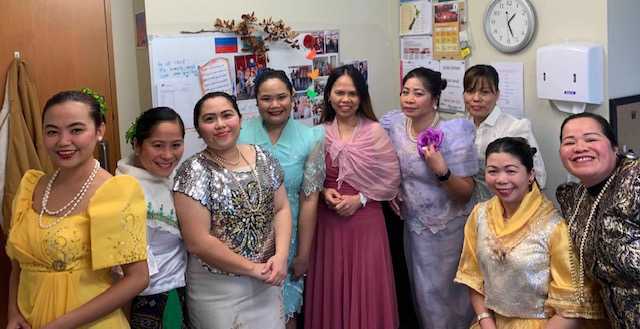
The Filipino staff of Ilam Avida Retirement Care in their national costumes celebrating Philippine Independence Day in the facility in 2019
Diana May David, Cordillera Administrative Region NZ
In the dairy farms of Canterbury, an indigenous group of Filipinos called the Igorots make up a large number of its workforce. They are among the more than 2000 migrant dairy farm workers that comprise 15 % of the NZ dairy industry labour force.
The Igorots, one of 110 indigenous groups in the Philippines, come from the mountainous Cordillera region where most of the Philippines’ vegetable supply are sourced. In 2012, they created their own organisation called the Cordillera Administrative Region (CAR) NZ. Today, CAR NZ has around 150 members composed not only of dairy workers but also beekeepers and construction workers.
For CAR NZ member Diana May David, Philippine Independence Day not only serves as a reminder of the heroism of those who fought for their independence but also a rare opportunity for Filipinos to congregate around the world on the same day once a year.
To mark this day, David said CAR NZ performs the unique Igorot Dance almost yearly in Cathedral Square. Clad in their Igorot costumes of mainly flaming red that symbolizes the fierceness and bravery that their tribes are known for, they perform different Igorot dances to the sound of gongs like the Tayaw, a dance of joy and celebration and the Takik, a courtship dance.
David said they are very proud to represent a Filipino indigenous group in local Philippine Independence Day events as they are able to exhibit the lesser known cultures in the Philippines.
“It is very significant for us to show and perform these dances as it is important for other nationalities to see more of Philippine culture,”
she said noting that their audience enjoy their performances which usually end in a lot of them joining the dances.
Jo Atara Mckenzie, Supling Playgroup
Seeing the need for a space to nurture in Filipino Kiwi children Filipino language, values, and culture through Filipino games, stories, and dance, Supling (children), the only Filipino playgroup in Christchurch was born.
According to Jo Atara McKenzie, a support worker and facilitator of Supling, the playgroup has now around 40 preschoolers who meet every Tuesday during term time. McKenzie said the Philippine Independence Day celebration is relevant because it is “another way of consciously looking back and celebrating what it means to be a Filipino in the present.”
“Maintaining one’s cultural identity is important for nurturing wellbeing and finding turangawaewae while navigating a multicultural country,”
she added.
McKenzie said Supling celebrated Philippine Independence Day last year by visiting two preschools where they shared Filipino songs, dances, and folktales. In the playgroup, they read a Filipino picture book, sang Filipino children songs such as Maliit na Gagamba (Small Spider) and Bahay Kubo (Nipa Hut) , played a Filipino game called Bankang Papel (Paper Boat) and shared a tea of Filipino food like pandesal (salted bread) and suman sa latik (glutinous rice in caramel sauce).
This year, she said they will do similar activities but adding in a Filipino poem reading, Philippine flag-making, and more dancing.
Johnny Betito, Christchurch Family
Johnny Betito’s family is one of hundreds of Filipino families living in Christchurch whose migration story mirrors most. Arriving a year after the 2011 earthquake, Betito found Christchurch still a broken city but one that also required his electrical engineering skills. A few hurdles after, the Betitos are now happily settled in the city.
For Betito, Philippine Independence Day celebrations remind Filipinos not only of their struggles but also of their strengths.
It’s good to remember that Filipinos have always been brave, resilient, and will not take being oppressed no matter what,”
he said adding that this is relevant today since Filipinos, both overseas and in the Philippines are still saddled with challenges. “Our battles just take other forms,” he noted.
With two young children, Yvaine and Elijah, growing up in NZ, Betito also pointed out that celebrating their homeland’s Independence Day is a tool to strengthen his kids’ heritage ties while also embracing Kiwi life and culture.
Last year, the Betitos observed Philippine Independence Day by attending a festive commemorative event in Tūranga. At home, Betito and his wife engaged their children in simple but enjoyable and culturally educative activities such as making Philippine flags and learning their symbolisms, singing Filipino folksongs, and dressing up in costumes inspired by their ethnic tribe, the Kalingas of Northern Philippines.
This year he plans to introduce to his children some Filipino traditional games he enjoyed as a kid and create shadow plays featuring Filipino folktales and Filipino hero stories.
Betito stated that more importantly, by learning about their roots through Philippine Independence Day celebrations, his children will also develop an inclusive multi-cultural perspective that is vital these days.
“They are taught that other cultures exist and can co-exist; that each culture is meaningful and beautiful, and deserving not just of enjoyment but appreciation and respect,”
Betito said.
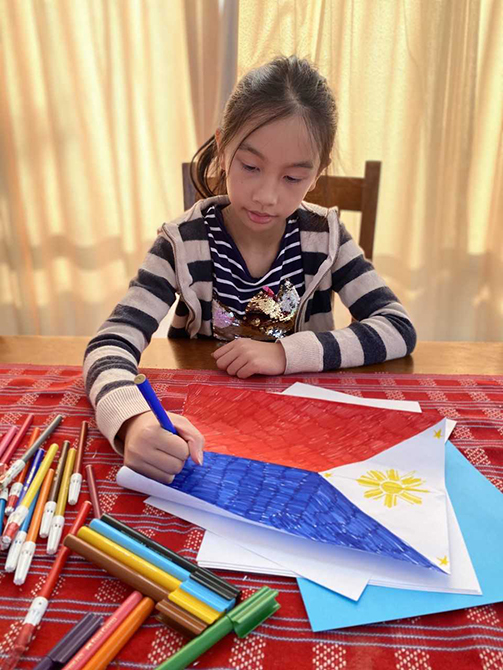 Article by Crystal Betito with contributions from Eileen Besenio, Hayley Concepcion, and Lulette Carnie
Article by Crystal Betito with contributions from Eileen Besenio, Hayley Concepcion, and Lulette Carnie
View more photos on Flickr
More about The Philippines
- Learn about parol making with Lulette
- Philippines Independence Day (2018)
- Philippine Independence Day celebrations in Tūranga, Saturday 15 June 2019
- Philippine Independence Day 2019 delights crowds in Tūranga
Filipino language
- Information for newcomers in Filipino.
- Find books and resources in our collection in Filipino including for children.
- Filipino eBooks can be borrowed from the eBook platform Overdrive.
- Filipino eMagazines and newspapers are available through PressReader. Read Filipino language newspapers.


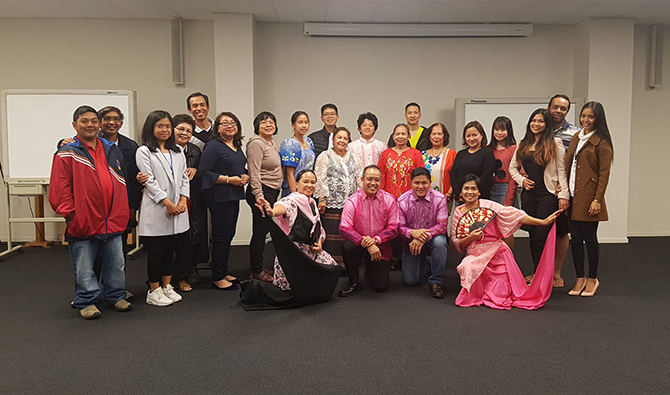
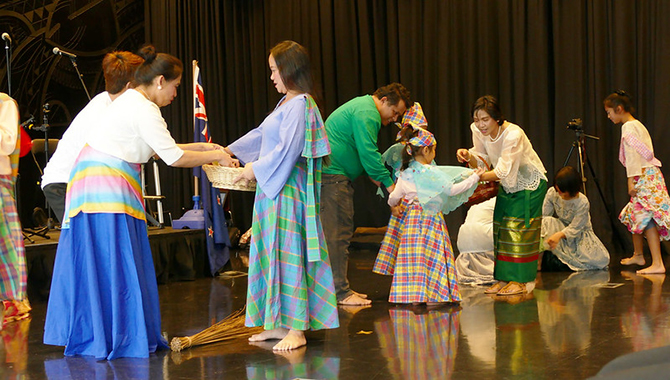
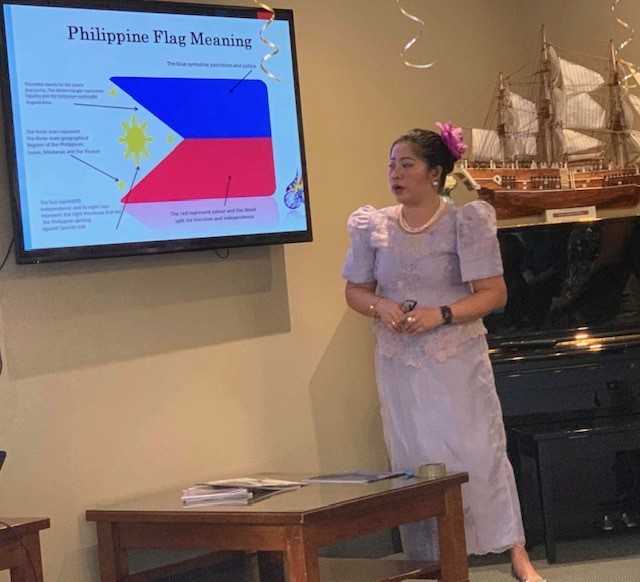
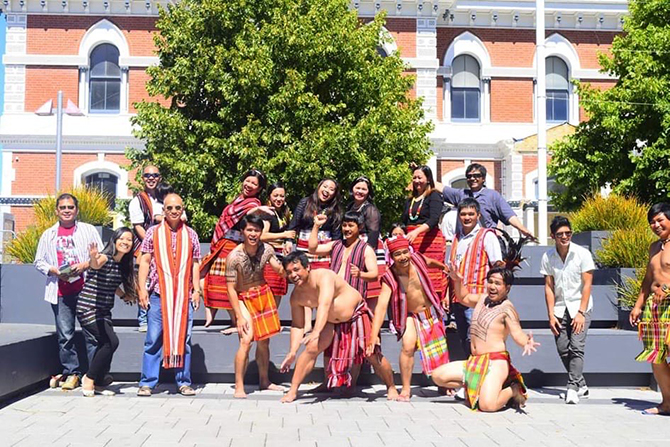
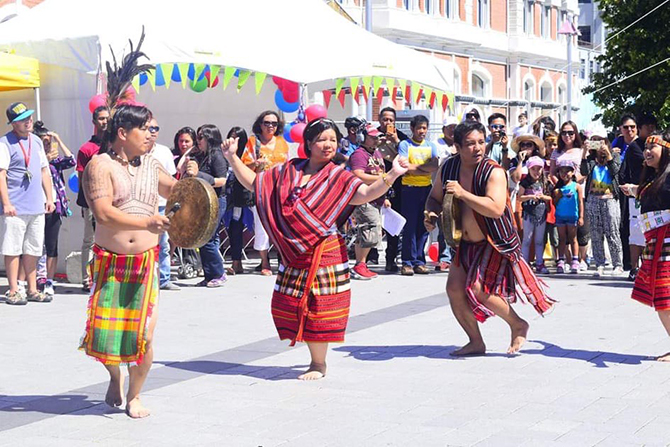
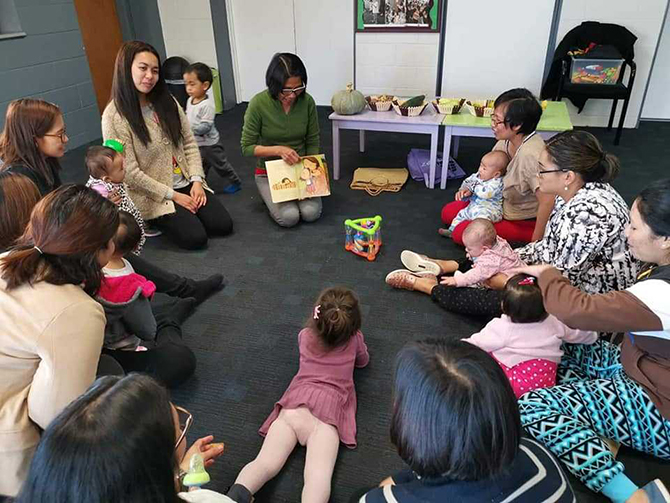
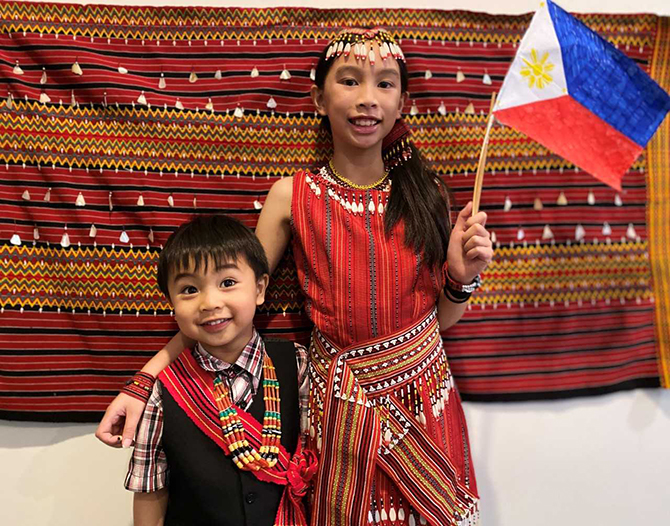







Add a comment to: How Filipinos Celebrate Philippine Independence Day in Christchurch